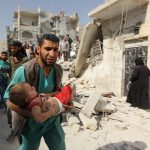This post originally appeared in The Huffington Post.
In their letter to U.S. President Barack Obama, Aleppo’s remaining doctors pleaded not for tears but for a plan to end the Syrian government’s all-out assault on hospitals and medical workers. And the response from the White House was the same as it’s been for months: we’re working on it.
Yet again, Aleppo’s doctors feel abandoned. And rightfully so. Last summer, when Physicians for Human Rights (PHR) documented the effect of the Syrian government’s systematic assault on doctors, health professionals, and the health care infrastructure of eastern Aleppo city, the sense of abandonment was palpable.
For the duration of the conflict, the U.S. and other governments have remained passive in the face of unprecedented violations of the Geneva Convention – the laws of war adopted in an effort to make conflict a little less hellish for civilians – including the imperative to protect hospitals and medical personnel.
And then, in February of this year, things appeared to shift.
The U.S. and Russia, co-chairs of the International Syria Support Group, announced they were “seeking to achieve a peaceful settlement of the Syrian crisis.” That meant establishing a cessation of hostilities and calling on all parties to “allow immediate humanitarian assistance to reach all people in need.”
To people living in opposition-held areas, it appeared that an effective cease-fire might take hold. While civilians continued to be killed and some hospitals were hit, the number of such incidents indeed dropped for much of March. But the respite was all too brief, and the United Nations failed miserably to deliver aid that would effectively break the sieges of cities and towns across the country and save lives.
The cessation crumbled, and the ensuing weeks and months have witnessed the most egregious, sustained attacks on medical facilities since the conflict began – indeed the worst campaign against health care anywhere in the world in recent memory.
Which raises the question: what plan did the U.S. have when it entered into this agreement with Russia? And that’s exactly what the doctors of Aleppo want to know.
They want to know how the U.S. government entered into an agreement with Russia, yet apparently had no plan to ensure Russia would comply with the terms of the agreement and enforce those terms if their Syrian allies or other parties violated them. They want to know what measures were in place to ensure that life-saving aid, including medical supplies, would reach people living in besieged areas.
The plan was: there was no plan. And the United States should’ve known better. Since the start of the conflict, the Syrian government has attacked hospitals nearly 300 times. Once the Russian government went from backing Syrian President Bashar al-Assad with military aid and political support to actually engaging in the conflict, the Russian air force also joined in attacking hospitals. PHR was able to document at least 16 strikes by Russian planes in the first four months of their military engagement.
The U.S. agreement with Russia was unenforceable from the start, with the U.S. knowing full well that Russia was willing to support and engage in unlawful tactics of warfare. In fact, many of the tactics being deployed in Syria are reminiscent of Russia’s approach in the second Chechen War under President Vladimir Putin that left Chechnya in ruins. As in Syria, respect for the principle of distinction – that is, confining attacks to combatants and not civilians – was non-existent.
Yet knowing Russia’s willingness to defy international law – and fully aware that the Syrian government could use a cessation to regroup and then continue to block humanitarian aid – the United States made a bad bet on an untrustworthy partner. And lost.
For the people living in eastern Aleppo city, now besieged themselves, and with bombs raining down on them from Syrian and Russian aircraft, it is unimaginable to think that the U.S. would be so indifferent to the suffering of civilians as to have no plan.
But it’s perhaps more appalling for the doctors. They have lived the last few years of their lives in the crosshairs as they work round the clock in partially destroyed hospitals, holding out hope that the United States had a strategy to stop the bloodshed. The White House response to their letter proved that there was never a plan, much less a backup plan. It was a rhetorical gesture at best, a betrayal at worst.
A call for leadership can seem amorphous at times. When the U.S. government stepped forward to play a leadership role with the International Syria Support Group, it needed to understand that leadership is not about symbolic actions or rhetoric. And the U.S. government needs to understand that in having made what appears to be a grave miscalculation, it has abandoned the people of eastern Aleppo again – in all likelihood with deadly consequences.

